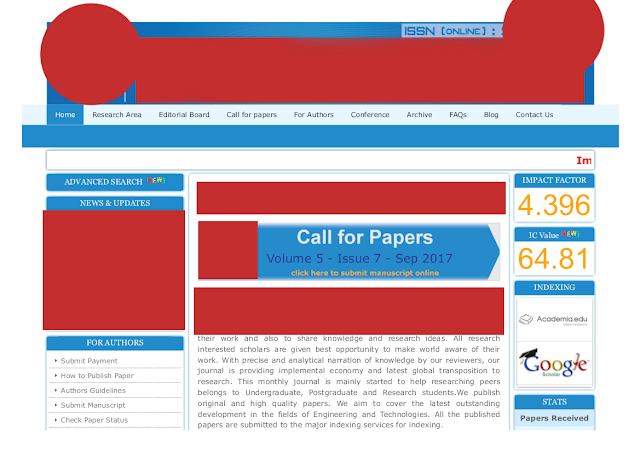1. The first thing we see is "Thomson Reuters' Research ID: ******** Indexed Journals" This is what the publishers say. Actually, it is "Thomson Reuters Researcher ID". From the FAQ section of Researcher Id I find this:
What is ResearcherID.com?
ResearcherID is a website where invited researchers can register for a unique ResearcherID number. At this site, users can: Update their profile information; Build their publication list using Web of Science search services or uploading a file; Select to make their profile public or private. Registered as well as non-registered users can search the Researcher Registry to view profiles and find potential collaborators.
From the above answer given, it is clear that the Researcher Id is meant for Authors and not for Publishers. This is something misleading and FYI, Impact factor calculated and published by Thomson Reuters (Journal Citation Reports) is highly recognisable and recommended metric by almost all indexing and abstracting institutions. Researcher Id is not an indexing portal and the publishers claim is not valid here.
2. The journal is having a Google Scholar profile Link!!! It's again surprising. Google Scholar is a freely accessible web search engine that indexes the full text or metadata of scholarly literature across an array of publishing formats and disciplines. Google Scholar profile is available for authors i.e Individuals. I am surprised how can a publisher have his Google scholar profile which doesn't make sense to me. The search engines collect metadata and other information from recognised websites. To know more about how the journals are included into google scholar read their inclusion policy. Create a profile and feeding the metadata is not a proper way of getting indexed in Google Scholar.
3. The impact factors mentioned above is not the same impact factors calculated by Thomson Reuters. The report is published by Clarivate Analytics which is successor of Thomson Reuters on publishing the report called "Journal Citation Reports"
4. The same website claims to be indexed in websites like Research Gate, Academia and etc..,. These are social networking sites for authors where they can meet and collaborate on research works. Here the authors use to feed their information about published papers, working papers, conferences, Books, datasets and much more.., So, Publisher claiming that they are indexed here doesn't make any sense.
5. Publishers like these, show they are indexed in Web of Science, Scopus, DOAJ and other reputable indexing directories. It is your duty to check the originality of information provided. Beware of such predatory publishers and Submit your original research work to reputed journals. It is also the duty of academicians to not to encourage such publishers. Many academicians publish their works in such journals because it's easy and fast to publish. The point to be noted is does it worth to call yourself a researcher publishing in such journals? I believe this is a corrupted way and the path leads to nowhere but its just a circle you are journeying. Let's do original research to explore ideas.
Let me know your viewpoints and Kindly point out publishers or journals you find to be predatory. Leave the points in the comment section below.
Share with your friends and Subscribe to Sulthan Academy.
Note: The post is to create awareness among academicians and not an act to prove someone's mistake. if any publisher finds such mistakes in their journals. Kindly take it as a constructive comments.
One more example here:


